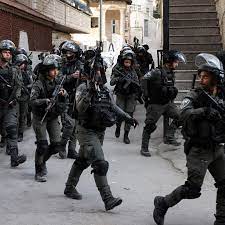Andrew Mitrovica
One of the obligations of writing a weekly column like this one is that you have to pay attention to an angry and ugly world. Another obligation is to not become inured to the constant anger and ugliness, which take different forms at different times in different places. As faithful readers of this column know, I write often about the horror Palestinians endure at the angry and ugly designs of their intransigent occupiers.
I write often about the cruelty and indignities that Palestinians suffer because they shock not only my conscience, but many other people’s attentive consciences, too. It is important for me as a writer to remind readers – in Israel, as well – how apartheid damages and disfigures its victims and its perpetrators. Recently, we have witnessed this obscene, recurring dynamic between the oppressor and the oppressed play out once more in such graphic detail that it defies belief. Earlier this month, 16 Israeli police officers were apparently needed to arrest Arwa Sheikh Ali, a 22-year-old Palestinian, at his home in the Shuafat refugee camp in occupied East Jerusalem. What reportedly happened to Sheikh Ali while he was being detained by 16 Israeli police officers during an alleged drug trafficking probe should offend anyone’s conscience to the core – no matter your nationality or faith.
He was blindfolded – a routine indignity that Israeli police inflict upon Palestinians to assert their impunity. They understand that they will not be held to account for what they do to Palestinians anywhere, at any time, for any reason. All of the police officers – every one of them – either shut off or did not turn their body cameras on. These are the only conclusions that can be drawn from the failure of 16 Israeli police officers to abide by the law and enable the devices. The law – domestic or international – is a silly afterthought when it comes to their violent “dealings” with Palestinians. And they intended to conceal their actions not so much from their superiors who invariably protect them, but from the less sympathetic “outside” world who might condemn them. So, what did 16 Israeli police officers try – collectively and consciously – to hide from you and me? Sheikh Ali’s lawyer, Vadim Shub, insists he was beaten in custody – severely. A judge agreed, saying: “From the photos shown to me, it appears that the arrest was accompanied by severe violence.”
Still, I do not believe that was it. We have watched scores of videos of Israelis in uniform beating Palestinians – girls and boys, women and men, young and old – with all sorts of weapons in all sorts of circumstances, including attacking the televised funeral procession of an assassinated Palestinian-American journalist, Al Jazeera’s Shireen Abu Akleh. Beating Palestinians is open sport for a lot of Israelis in and out of uniform – emboldened and empowered as they are, by an apartheid state determined to terrorise Palestinians into submission. What may have concerned the 16 police officers just a little bit was the worldwide reaction to photos that later emerged showing what appears to be the Star of David branded on one of Sheikh Ali’s cheeks and how it possibly got there. For some, like me, the disturbing images stunned the conscience. For others – among them, enraged Israelis – they are an appalling example of the depravity that an apartheid state encourages and countenances in its ruthless, systemic pursuit of ethnic and religious supremacy over an occupied people. Israelis and their evangelical supporters must finally acknowledge that undeniable fact. Before I address the predictable attempts from the predictable quarters to diminish or dismiss the beating and branding of Sheikh Ali, I need to remind the deniers of the following. First, a decidedly pro-Israel news agency broke the story of the sickening allegations. Second, the head of the Jerusalem public defender’s office is convinced that his client was indeed branded with the Star of David. Lastly, the Israeli judge who considered Sheikh Ali’s police brutality complaint has expressed “horror” at the shocking incident.
Yet, on cue, a senior Israeli officer backed the police officers involved. “This is a field trial by the media,” he said. “I trust the officers who were there and their credibility.” But Justice Amir Shaked has questioned the officers’ contrived “credibility.” He found “no reasonable explanation” for why the markings appeared on Sheikh Ali’s cheek and how all 16 bodycams were not working. For his part, Sheikh Ali told an Israeli reporter that: “A police officer put a taser to my head. I felt something hot on my face. These are not police – this is the mafia.” The police’s belated explanation is as ingenious as it is absurd. Drained of its police-laced jargon, it goes like this: Yes, we branded Sheikh Ali’s face, but it’s not the Star of David, it’s the remnants of a shoelace of a police officer’s boot that was pressed against his face for a long time. We had to step on his face for a long time because he resisted arrest. Much of the Israeli media isn’t buying the police’s fantastical “shoelace” theory. Nor is Dr Avner Rosengarten, the head of the Israel-based Forensic Science Institute which proudly proclaims that it is made up of “senior experts who served in the Israeli police.”
On Sunday, Rosengarten said that there was no match between the alleged boot and laces and the mark on Sheikh Ali’s scarred, bloodied face. “It’s not this shoe, and it’s not these laces. It seems that the markings were created by a metallic tool or instrument,” he said. “The laces can’t leave this kind of imprint, as the edges are bleeding; it must be a straight, solid instrument … the laces also don’t have the pressure and force required to create this mark.” In this rare instance where Israeli authorities are bending to science and a wide, building outrage, a police officer accused of branding Sheikh Ali has reportedly been suspended for 12 days and briefly put under house arrest while this astonishing matter is investigated. That outrage is fuelled in significant part by the jarring historical resonance of branding which is familiar, of course, to generations of Jews. Michael Sfard, an Israeli human rights lawyer, made the inescapable comparison in an interview with The New York Times. “There’s something about this case that captures the mind of people who usually would look away when it comes to police brutality against Palestinians,” he said. “It is a very symbolic abuse, one that many Jews remember or have an immediate connection to because in the past Jews have been victims of similar humiliation.” Israel and its blind, stubborn allies ought to stop “looking away” and accept responsibility for the disgraceful humiliation of Arwa Sheikh Ali and every Palestinian who has been humiliated yesterday and today by a racist apartheid regime intent on stripping them of their land, homes, livelihoods, freedom, futures and humanity.







